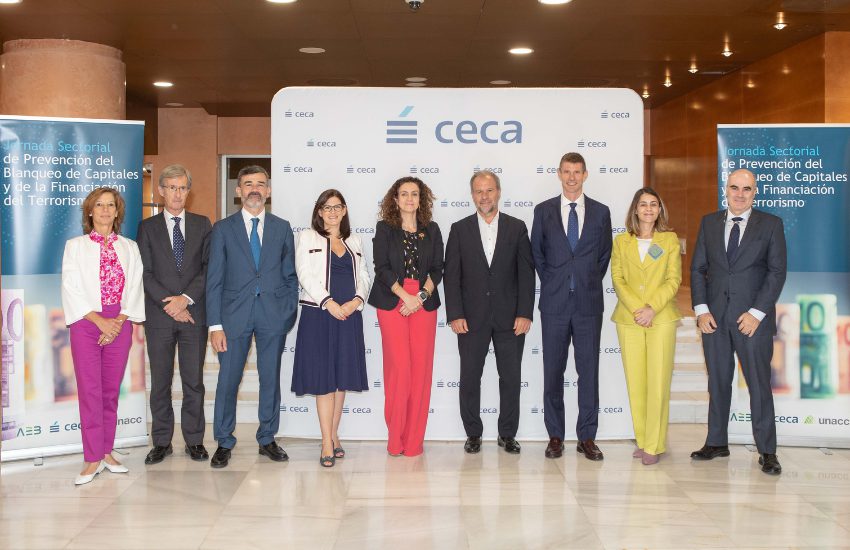CECA, AEB and UNACC, in collaboration with Sepblac, have organised the 6th Sectorial Conference on Anti-Money Laundering and Countering the Financing of Terrorism
The meeting brought together leading representatives from the European Commission, the Directorate-General of the Treasury and Financial Policy, the Directorate-General for Insurance and Pension Funds, the Bank of Spain, the CNMV and credit institutions
The conference seeks to promote dialogue between the private and public sectors with regard to AML/CFT
The banking associations CECA, AEB and UNACC, in collaboration with Sepblac, have organised, for the sixth consecutive year, the Sectorial Conference on Anti-Money Laundering and Countering the Financing of Terrorism, which brings together leading experts from the banking sector on AML/CFT in Spain, supervisory bodies and regulatory authorities.
The event, held at CECA's assembly hall, aims to promote dialogue between the private and public sectors on anti-money laundering and countering the financing of terrorism. Credit institutions stand out in particular for their diligence and compliance in collaborating with the authorities in the fight against this crime, something which has been recognised by reports from international organisations specialising in this area.
The conference attracted representatives from almost all the credit institutions belonging to the organising associations, all of them specialised in AML/CFT. This new edition focused on updates on regulatory developments, the latest types of risk, the supervisory approach and other topical issues, such as the impact of international financial sanctions and Spain's candidacy to host the new European Anti-Money Laundering Authority (AMLA) in Madrid, which has the support of the sector.
Raquel Cabeza, Corporate Director of Risks and Compliance at CECA, opened the event and introduced the first point of the day, the new regulatory developments, which represent a major challenge for the industry.
For Irene Sánchez, advisor to the Treasury's Subdirectorate-General for the Inspection and Control of Capital Movements, the regulatory developments that institutions will have to face in the coming months will be shaped by the creation of the new European authority, within the European legislative package EU AML package, and the Spanish Presidency of the Council of the European Union.
This was followed by three round tables involving representatives from the public and private sectors, exchanging knowledge, experiences and best practices.
The first panel, addressing the impact of international financial sanctions with special attention to those derived from the war in Ukraine, featured África Pinillos, Head of Supervision at Sepblac, Sergio Tresgueras, Deputy Assistant Director of the Treasury's Subdirectorate-General for the Inspection and Control of Capital Movements, Concha Picón, Director of the Sanctions Advisory Unit at Banco Santander, and Roberto Crespi, Team Leader in the Sanctions Unit of the DG Fisma-European Commission. María Peco, Senior Advisor for Legal Affairs and Anti-Money Laundering at AEB, moderated this round table.
The second round table, addressing the challenges posed by new typologies and trends in AML/CFT, was moderated by Cristina Freijanes, Secretary General of UNACC. The speakers, Adolfo Bescós, Head of Financial Intelligence Coordination at Sepblac, Margarita Rufas, Head of Planning Coordination at Sepblac, Gregorio Álvarez, Head of the Spanish Tax Agency's Seconded Unit at Sepblac, Evaristo Ramírez Llamas, Head of AML and CFT at Unicaja Banco, and Alfredo Alonso Conde, Head of Legal Advice and Regulatory Compliance at Caja Rural de Granada, have addressed the quality of suspicious transactions reports by bound parties and the impact of crypto-assets on the world of prevention, among other issues.
Finally, the last panel, moderated by Raquel Cabeza, Corporate Director of Risk and Compliance at CECA, discussed current issues in the field of supervision and featured the country's leading representatives on anti-money laundering: Juan Ramírez, Head of the Coordination of Supervision and Inspection at Sepblac, Federico Cabañas, Head of the Anti-Money Laundering Group of the Directorate-General for Supervision of the Bank of Spain, José María Díaz Taboada, Head of the Anti-Money Laundering Unit of the CNMV, and José Antonio Fernández de Pinto, Deputy Director General of Inspection at the Directorate-General for Insurance and Pension Funds.
The sectorial conference drew to a close with a presentation by Pedro Comín, Director of Sepblac, who thanked the industry for its participation in this event, a good example of public-private collaboration, which is crucial in the face of the challenges that the entire prevention sector will have to tackle in the coming years, explaining that: "With regard to the future, we have to be as well prepared as possible, but it is also very important to adapt to change and to the contingencies that the new authority and the new regulation will entail", to which he added: "Our interest as supervisors is that best practices always become tomorrow's standards, the norm".









